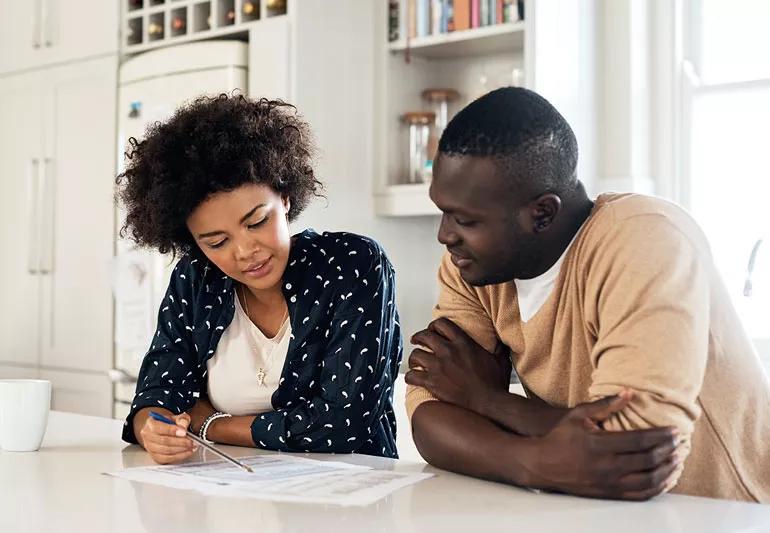COVID-19 has increased stress & fighting for many couples

Image content: This image is available to view online.
View image online (https://assets.clevelandclinic.org/transform/1c1b45a6-1339-4325-9c0d-e557ae8682e1/coupleWorkTogether-882197560-770x533-1_jpg)
couple working together
Has being cooped up due to COVID-19 caused conflict in your relationship? If so, you’re not alone. Many couples are feeling an emotional strain on their relationship due to the stress of the coronavirus pandemic.
Advertisement
Cleveland Clinic is a non-profit academic medical center. Advertising on our site helps support our mission. We do not endorse non-Cleveland Clinic products or services. Policy
Bickering, miscommunication, minor annoyances and the burden of being together 24/7 can lead to blowouts, lingering negativity and relationship stress.
Psychologist Scott Bea, PsyD, shares the best ways to resolve an argument.
For many couples, COVID-19 measures have resulted in spending a lot more time together. Being in the same house day in and day out can sometimes lead to arguments.
Dr. Bea encourages couples to take some time to cool off before coming back with a recovery plan after a disagreement. Try to go into another room or step outside on the patio for a quick break and fresh air.
“If we could notice that when we’re in the heat of an emotion, in a conflict, that’s maybe not the best time to absolutely resolve it, because we may say things that we regret or are hurtful,” he says. “If we could develop a plan on how we recover quickly after that, endorse similar values and interest in protecting one another by finding shared solutions – that would be ideal.”
What we do after an argument can have a lasting impact on the health of our relationships. In fact, there’s research that shows when people take action by apologizing or seeking outside help, their relationship fared better in the long run.
Advertisement
Dr. Bea warns that other behaviors, such as avoidance, can have the opposite effect.
“Things like criticism, defensiveness, contempt, stone-walling or a refusal to engage in problem-solving – if you notice those are growing in your relationship, you’ll want to take some steps if you value that relationship, and if you value being happy instead of being right,” he says. “Sometimes we have to humble ourselves and say there’s some things I can learn and some things I can modify.”
Conflict resolution takes practice and it’s not easy, but if we can dedicate ourselves to working on our skills or enlisting the help of a counselor, it can help.
Dr. Bea says once couples start getting hostile or detached, it creates real problems and people have a hard time finding their way back.
“We’re reflexively human and we have to find ways to acknowledge that we might run off the rails a little bit, but we’re really interested in recovering,” says Dr. Bea. “We could practice ways of doing that or get some professional help if it’s really starting to become an interference in how you maintain intimacy in a relationship.”
It can be hard to know exactly what to do after a dispute, simply because problem-solving isn’t something that we typically rehearse.
Dr. Bea says those who are active in resolving conflict seem to recover quicker emotionally than those who use a passive approaches instead.
So sure, take some time to cool off after an argument, but don’t let your feelings fester and bubble over for the next several days. Work towards resolution with your partner, together. Your relationship will be better because of it.
Advertisement

Sign up for our Health Essentials emails for expert guidance on nutrition, fitness, sleep, skin care and more.
Learn more about our editorial process.
Advertisement
Communicating clear limits helps protect your time, energy and emotional well-being
Being hooked on love can cause unhealthy relationship patterns and obsessive thoughts
When someone guilt trips you, they’re using emotionally manipulative behavior to try to get you to act a certain way
This behavior is usually a sign that the other person doesn’t know how to handle conflict or is prone to being passive-aggressive
It can be harder to let go when you’ve invested time, energy and emotions — but it might be the healthier choice long term
Attachment theory suggests that your earliest relationships shape connections throughout your life
Love languages are defined by the way you prefer to give and receive affection
There are many different ways to love someone and yourself
Prioritize your health by managing stress, strengthening your social connections and getting quality sleep
Bolsters, blankets, pillows and blocks can offer extra support, stability and comfort
Allergies, postnasal drip, asthma or reflux could be to blame for a cough that won’t quit